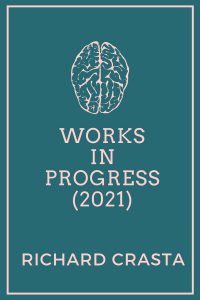Here’s a quick but necessary follow-up to my previous post on Parkinson’s Disease, and its possible hubris in that it was written by a writer who has read barely around 100 pages on the subject.
Here are a few hopeful suggestions on how to live longer, even with Parkinson’s. Please, doctors and others, correct me if I am wrong, preferably by sending an email to richard.crasta[at]gmail.com
The suggestions:
1. Have a purpose in your life. Live for somebody or some cause bigger than yourself. To me, I think the purpose that has kept me alive so far is a passionate desire to complete my semi-finished books, and published my unpublished ones, before I lose the ability to do so. This would require that I use every moment of my time efficiently, and to overcome my distractions and unnecessary addictions.
2. The main medication or substance that you ingest, as treatment for Parkinson’s, is Levodopa. All other substances are those that enhance and prolong the effect of the Levodopa in your system.
3. Have a partner or friend or paid helper who will remind you of medications, your schedule for medications and an efficient life. Missing exercise (I haven’t exercised in 3 weeks, and walking hasn’t been enough to compensate) is like stabbing yourself repeatedly in the hope of improving your blood circulation. It is insanity to shorten your life when part of your life force comes from wanting to complete and publish your books. Don’t do it!
4. Walking is also irreplaceable. The act of walking mindfully gives you peace, helps your system function at a higher rate, and makes you look forward to breathing fresh air and keeping yourself a bit removed from mundane distractions and stress, for an hour or so.
5. Be compassionate and empathetic, and don’t hate. This is especially in reference to the major wars and the new wars breaking out everywhere. Your intolerance and hate will hurt you more than it helps anyone.
6. Keep yourself goals for intelligent reading (even if you have to start with one page a day), talking (even if it is repeating a Shakespeare speech, such as “What a piece of work is man!” or “Now is the winter of our discontent”, or one of Martin Luther King Jr.’s or Abraham Lincoln’s great speeches), connecting with friends, lovers, ex-lovers if need be. Singing and laughter, and listening to music that I love: it also improves my moods–depression being one of the main manifestations or symptoms of Parkinson’s. At this moment in 2024, after 35 years of intermittent trying, I have yet to find an antidepressant whose side effects aren’t worse than simply living with depression. The last medication that I had to give up was Bupropion, and I returned to Seligiline, which helps me somewhat, but which I have to be careful with my diet, avoiding cheese, chocolate, sausages, and other foods that I love! [Stop press: I have had to give up Selegiline, which had the effect of putting me to sleep at night, suddenly, wherever I may be at that moment: on the toilet, on the edge of a bed, or in a chair.
7. I seem to hear of better medications than Carbidopa-Levodopa, but they would require a 2-month trip to the US, which is proving to be harder to finance. Why are there no better medications or treatments available in Cambodia? If you hear of any possible improvements in treatment, don’t keep it to yourself. The prices of newly discovered treatments are often too high, but making them available to a greater number of people will enable more competition and lower prices to drop. And hurrah for countries such as India, that encourage the manufacture and sale of non-brand-name medications … cheaply. It is unfair that the rich have such a huge advantage over the poor, that it extends to long and happy lives for one class of person, and quick or lingeringly painful extinction for the other class.
On this bright note (oh, by the way, confusion and inability to make decisions are also symptoms affecting those bearing the mitre and silver hat of Parkinson’s, so have some compassion if they display such behavior in your presence), I end this totally unsolicited and unauthorized contribution to the Galactic Encyclopedia of Parkinson’s Disease and its 8.5 million Living Carriers.











